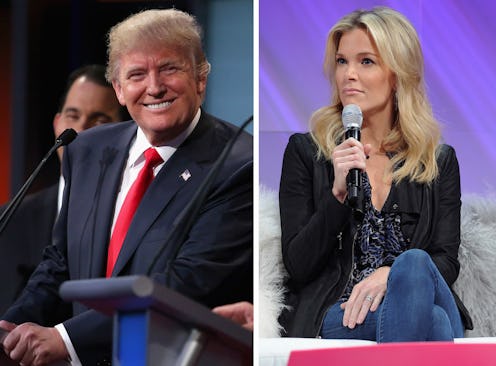Donald Trump wasn't the only one dealing questionable language out towards Megyn Kelly after last Thursday's debate; it also unleashed the Internet trolls, who attacked Megyn Kelly with unrelenting vitriol. In fact, it got so bad that developer Izzy Galvez even created a chart to illustrate it visually — and the worst part is that what the chart shows isn't unexpected. This is just one instance in a long line of women being harassed online purely for speaking out against sexism.
To recap, here's the context: During the Republican debate last week, moderator Megyn Kelly brought up Donald Trump's many past misogynistic references to women, in which he's called them everything from "fat pigs" to "disgusting animals." Things didn't exactly go well, and on Friday, they got even worse. Recounting the conversation to CNN's Don Lemon, Trump said, "You could see there was blood coming out of her eyes. Blood coming out of her wherever." The comment quickly sparked uproar, causing the hashtag #PeriodsAreNotAnInsult to sweep Twitter and ignite conversations about sexism.
Galvez's chart, created on Topsy.com using data from Twitter, displays an increase in tweets mentioning Kelly along with the words "cunt," "whore," "bitch," and "slut" — both during and after the debate. Based on the data below, it's pretty clear that the harassment Kelly faced wasn't just momentary. It's also hard not to wonder whether, had Kelly been a man asking that very same question, the conversation might not have gone differently.
Speaking with Bustle, Galvez said he decided to dig into the data after he noticed several men's rights groups making misogynistic remarks about Kelly on Twitter. His curiosity proved well-founded: "Just as expected, I found a big spike in these kind of tweets on Twitter that matched up with the GOP Debate and Donald Trump's tantrum," Galvez said.
That sure is one giant spike. Here's just a sampling of the disturbing tweets we owe it to (plus some others that continued to flood Twitter even after the analysis):
Fortunately, my searches for "Megyn Kelly slut," "Megyn Kelly cunt," "Megyn Kelly bitch," and "Megyn Kelly whore" through Twitter also yielded some surprisingly encouraging results, which proves not all humanity is lost:
Galvez, who has been doxxed and SWATed himself for speaking out against GamerGate, pointed out that the hate Kelly has received is really part of a larger online hate movement that has been brewing against women for some time. Just last year, a Pew Research report on online harassment revealed that women ages 18 to 24 disproportionately experience stalking and sexual harassment online. And sadly, there have been countless examples of this. Consider Alex Blank Millard's recent Twitter photo experiment: After being trolled and harassed online, Millard changed her photo to a man's and continued tweeting about things like feminism, sexism, and fat shaming — just to see if the reaction she received was kinder. Spoiler alert: it totally was. It's hard to ignore stories like these (and cold, hard data, for that matter) that suggest the many violent threats we see on social media often stem from misogyny.
Twitter's attacks against Kelly serve as a sobering reminder that the harassment women face online and in the media for merely speaking out against sexism doesn't end on TV, or even in the comment sections of their articles. The message is clear: As long as the current social landscape remains the same, Internet trolls will find a way to torment women. And as the backlash against Kelly demonstrates, these responses have nothing to do with differences in opinion regarding the presidential election, and everything to do with the desire to silence women's opinions altogether. The trolls themselves may not view it that way, but the data sure does.
Image: Courtesy of Izzy Galvez
